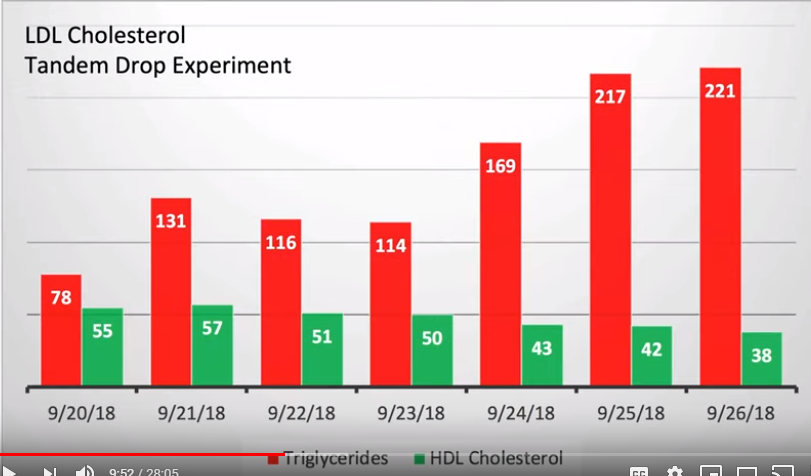What I’m Watching: Dave Feldman Cholesterol Talk
Dave Feldman is in interesting guy. He is considered an expert in Cholesterol and is doing many self-experiments to test his theories. When he started a low carb diet, he noticed that his LDL (low density lipoprotein) skyrocketed. This would generally cause a doctor to immediately prescribe cholesterol lowering medications. Dave is a data nerd and then started meticulously tracking his food, bloodwork, and glucose to see how he could manipulate his bloodwork based on food timing, food choices, and exercise.
The common line of thinking is that increased LDL markers in the blood drastically raise chance for cardiovascular disease. Dave has pieced research together that says that it isn’t that simple. His theory, based on his research and extreme self experiments, show that High LDL, and High HDL, with overall Low Triglycerides has no correlation to higher cardiovascular disease.
In this talk, he mentions the ‘lipid triad hypothesis’ and explains the interplay of the above.
He also covers his exercise experiment where he monitors his LDL during strength training and during HIIT training. He postulates that when we get sore, our body consumes LDL to repair some of the muscle tissue damage incurred. This explains the trends in studies involving muscle training on lowering LDL. He then confirmed this for himself in an n=1 experiment.
His White Bread Experiment was a 2 week period where he ate white bread and processed lean meat sandwiches. Eating ‘heart healthy grains’ drove his LDL down to a record low of 83. Which, if we are only concerned with ‘the bad cholesterol LDL’, would make a doctor extremely happy. Why did it drive the LDL down? What did it do to his triglycerides and HDL (good cholesterol). He posits that the drop in LDL is from no longer being fat adapted which leaves fewer LDL particles in the blood after the various fat-adapted processes occur in the body. His cholesterol at the end of the experiment looks like that of a heart disease patient. His blood glucose was super up and down during the white bread experiment, as opposed to rock solid on a keto diet.

White bread drove down the LDL 
But trashed his HDL, Triglycerides
His weight gain experiment was outlined next. He ate a standard american diet for a few weeks, then a calorie controlled SAD. Then he switched back to keto. His most interesting finding was tracking his weight and his triglycerides. As his weight fell, his triglycerides also fell accordingly. Likewise as he lost weight, his LDL-C rose as he lost weight. This a common thing when people switch to keto. They often get blood tests and freak out that their LDL is rising. It’s probably not a problem at all.

Lastly he outlined his carnivore experiment, and the time sensitive nature of triglyceride numbers post meal. He draws a strong correlation between time since the last meal, and when the triglycerides rapidly fall. This ‘fasting time’ was 12 hours. So it’s something to keep in mind when doing fasting for health. You should start the ‘fasting clock’ 12 hours after your last meal, as that’s when your body truly starts fasting.
If you are concerned with cholesterol and really want to understand the folks at the leading edge, you should be following him.